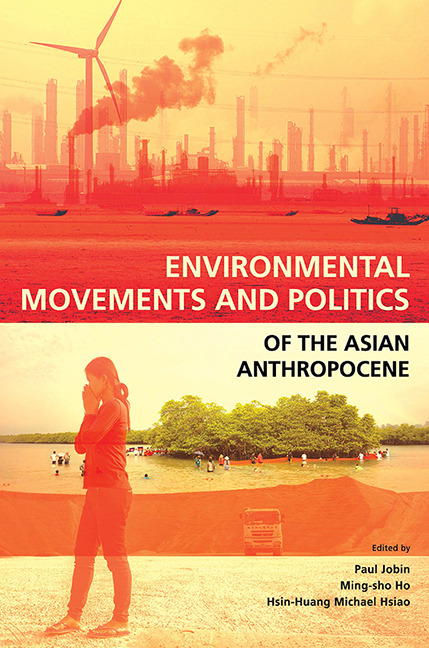Book contents
- Frontmatter
- Contents
- List of Tables, Maps and Figures
- Acknowledgements
- About the Contributors
- 1 Environmental Movements and Politics of the Asian Anthropocene: An Introduction
- 2 Environmental Movements in Taiwan’s Anthropocene: A Civic Eco-Nationalism
- 3 Environmental Movements in Post-handover Hong Kong: Between Managerialism and Radicalism
- 4 The Post-politics of Environmental Engagement in Singapore
- 5 Environmental Movements in the Philippines: Contestation for Justice in the Anthropocene
- 6 Environmental NGOs in “Post-New Order” Indonesia: Saving the Forests Through Democracy
- 7 Environmental Activism in Malaysia: Struggling for Justice from Indigenous Lands to Parliamentary Seats
- 8 State, NGOs, and Villagers: How the Thai Environmental Movement Fell Silent
- 9 Environmental Movements in Vietnam under One-Party Rule
- 10 The Cambodian Neopatrimonial State, Chinese Investments, and Anti-dam Movements
- 11 Conclusion: Environmental Movements and Political Regimes, or Why Democracy Still Matters in the Anthropocene
- Index
5 - Environmental Movements in the Philippines: Contestation for Justice in the Anthropocene
Published online by Cambridge University Press: 08 October 2021
- Frontmatter
- Contents
- List of Tables, Maps and Figures
- Acknowledgements
- About the Contributors
- 1 Environmental Movements and Politics of the Asian Anthropocene: An Introduction
- 2 Environmental Movements in Taiwan’s Anthropocene: A Civic Eco-Nationalism
- 3 Environmental Movements in Post-handover Hong Kong: Between Managerialism and Radicalism
- 4 The Post-politics of Environmental Engagement in Singapore
- 5 Environmental Movements in the Philippines: Contestation for Justice in the Anthropocene
- 6 Environmental NGOs in “Post-New Order” Indonesia: Saving the Forests Through Democracy
- 7 Environmental Activism in Malaysia: Struggling for Justice from Indigenous Lands to Parliamentary Seats
- 8 State, NGOs, and Villagers: How the Thai Environmental Movement Fell Silent
- 9 Environmental Movements in Vietnam under One-Party Rule
- 10 The Cambodian Neopatrimonial State, Chinese Investments, and Anti-dam Movements
- 11 Conclusion: Environmental Movements and Political Regimes, or Why Democracy Still Matters in the Anthropocene
- Index
Summary
From the 1970s to the mid-1980s, environmental advocacy in the Philippines was subsumed within the broader demands of the democratic struggle. Elsewhere in Asia, opposition to authoritarianism triggered a strong partnership between environmental movements and democracy movements (Lee et al. 1999). The democratic transition in the late-1980s opened up political opportunities for the environmental movements to voice their agenda for change in the 1990s (Magno 1999). While democratization broke new ground for collaboration between civil society and government reformers, the politics of contention continued to simmer in resource conflict zones in the twenty-first century.
This chapter examines how political arrangements have influenced environmentalism, and conversely, how environmental movements have affected national politics in the Philippines in the past two decades. These processes are analysed through the framework of environmental justice and in the context of the historical period identified as the Anthropocene. According to Crutzen's seminal article (2002), the Anthropocene refers to the “human-dominated geological epoch” that started in the latter part of the eighteenth century. The notion has thus become a marker for the “profound, global and irreversible alterations of the Earth's ecosystems by collective human activity” (Cho 2014, p. 3). But the epochal shift characterized by human-driven environmental changes, including pollution, natural resource degradation, water scarcity, and climate change, are also accompanied by growing social inequalities (Stengers 2015). In this regard, the use of an environmental justice lens highlights “how the results of environmental and climatic change became differently distributed over the human populations of the world and which communities have carried the burden of the ‘ecological footprints’ of commodity consumption” (Lane 2015, p. 11).
In the Philippines, centuries of Spanish domination imposed a radically uneven access to land and natural resources, which has never been challenged by a comprehensive land reform programme (as happened, for instance, in Taiwan and Japan after World War Two). The landed nobility (latifundistas) has survived until today, metamorphosed into a political elite and a ruling class of capitalists. In reaction, social activists, progressive Church leaders, and trade union organizers have encouraged vulnerable communities to develop an “environmentalism of the poor”.
- Type
- Chapter
- Information
- Environmental Movements and Politics of the Asian Anthropocene , pp. 139 - 170Publisher: ISEAS–Yusof Ishak InstitutePrint publication year: 2021

